IIPP organises all-women panel at COP 28 with keynote from Prime Minister Mia Mottley
11 December 2023
Mariana Mazzucato calls for moving from financing gaps to restructuring finance – based on her recent report with the UN Department for Economic and Social Affairs (DESA) and op-ed for the Financial Times.
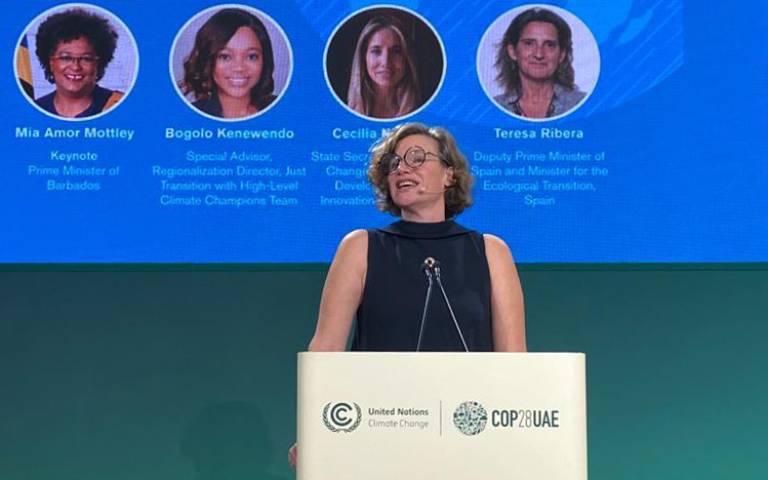
On the first day of COP 28 in Dubai, countries agreed to a $429 million Loss and Damage Fund. With the climate financing gap sitting at a staggering $4.3 trillion, that is not enough. The panel, which IIPP organised with UNFCCC and the Government of Argentina, focused on moving away from reactively filling financing gaps to proactively restructuring finance.
For the third year in a row, IIPP convened an all-woman panel (see IIPP’s COP27 panel and COP26 panel) to challenge the dominant headlines at COP 28. This year’s panel From a Financing Gap to Outcomes-Oriented Finance featured Mariana Mazzucato (Founding Director of IIPP) as moderator and organiser, Mia Mottley (Prime Minister of Barbados), Teresa Ribera (Deputy Prime Minister of Spain and Minister for the Ecological Transition), Bogolo Kenewendo (Former Minister of Trade of Botswana), and Cecilia Nicolini (State Secretary of the Climate Change, Sustainable Development and Innovation of Argentina).
The panel was based on Professor Mazzucato’s recent policy note with the UN Department for Economic and Social Affairs (DESA) and her Financial Times article, which call for governments and public development banks to shape and direct finance in a more mission-oriented way.
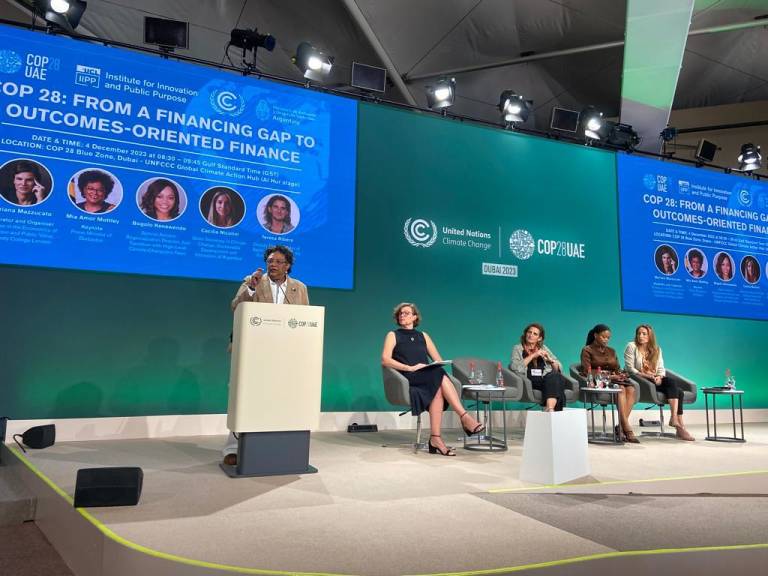
Prime Minister Mia Mottley delvers the keynote at IIPP’s event on climate finance.
Prime Minister Mottley gave a powerful keynote address on the urgency of the moment and the scale of the challenge, “The ownership of the problem is global, not just governmental.” The Prime Minister also emphasised the economic and moral imperative of climate mitigation: “For every $1 we spend now in building resilience, we avoid $7 in damage, and the loss of lives.”
In her opening remarks, Professor Mazzucato argued in favour of an “economy-wide transformation – one that puts like our climate targets at the centre of how we design our economies and finance.” As she laid out in her Financial Times op-ed, instead of focusing on reactively filling financing gaps, now is the moment to proactively shaping and directing finance that is patient, long-term, and mission-oriented.

Professor Mazzucato during the Global Commission on the Economics of Water flagship event with Reem al Ashimy, Gim Huay Neo, Mohamed Diatta, Freda Prempeh, Saroj Kumar, Wendy Broadgate and Ngozi Okonjo-Iweala.
Prof Mazzucato was joined in Dubai by her Policy Advisor Luca Kühn von Burgsdorff and IIPP Cities Programme Manager Isadora Spillman-Schappell.
A key debate at this year’s COP was the first ever global stocktake (which countries agreed to at COP 21 in Paris in 2015) and whether to include a commitment to phase out fossil fuels in the output document. Governments and public development banks are central to delivering the patient finance required to phase out fossil fuels and scale up renewables.
In meetings with Remy Rioux, CEO of the Agence Francaise Development (AFC), and Dilma Rousseff, President of the New Development Bank, Prof Mazzucato shared the key messages from her UN DESA policy note and discussed the importance of bringing together multilateral, regional, and national development banks around shared objectives – like achieving net zero energy production – using a mission-oriented approach.
Climate change is increasingly destabilising the global water cycle – just as a destabilised water cycle is leading to more extreme floods, longer droughts, and stronger hurricanes. Yet policy makers have failed to connect the dots between the water and climate crises.
As Co-Chair of the Global Commission on the Economics of Water, Prof Mazzucato made the case for a more comprehensive approach to water, climate, and biodiversity challenges in a joint op-ed with her fellow Co-Chair Johan Rockström, alongside Nick Stern (author of the Stern Review on the Economics of Climate Change) and Partha Dasgupta (author of the Dasgupta Review on the Economics of Biodiversity. The four academic leads of the three big environmental reviews argued in favour of a global agenda around water.
Prof Mazzucato brought these messages to her keynote address at the COP Presidency’s mainstage event on Nature and Water Finance for Climate Action, where she spoke alongside Axel Van Trotsenburg, Senior Managing Director of the World Bank, and to the commission’s Flagship Event with her fellow Co-Chair Ngozi Okonjo-Iweala.
See more photos of IIPP at COP28: https://www.flickr.com/photos/163367967@N08/
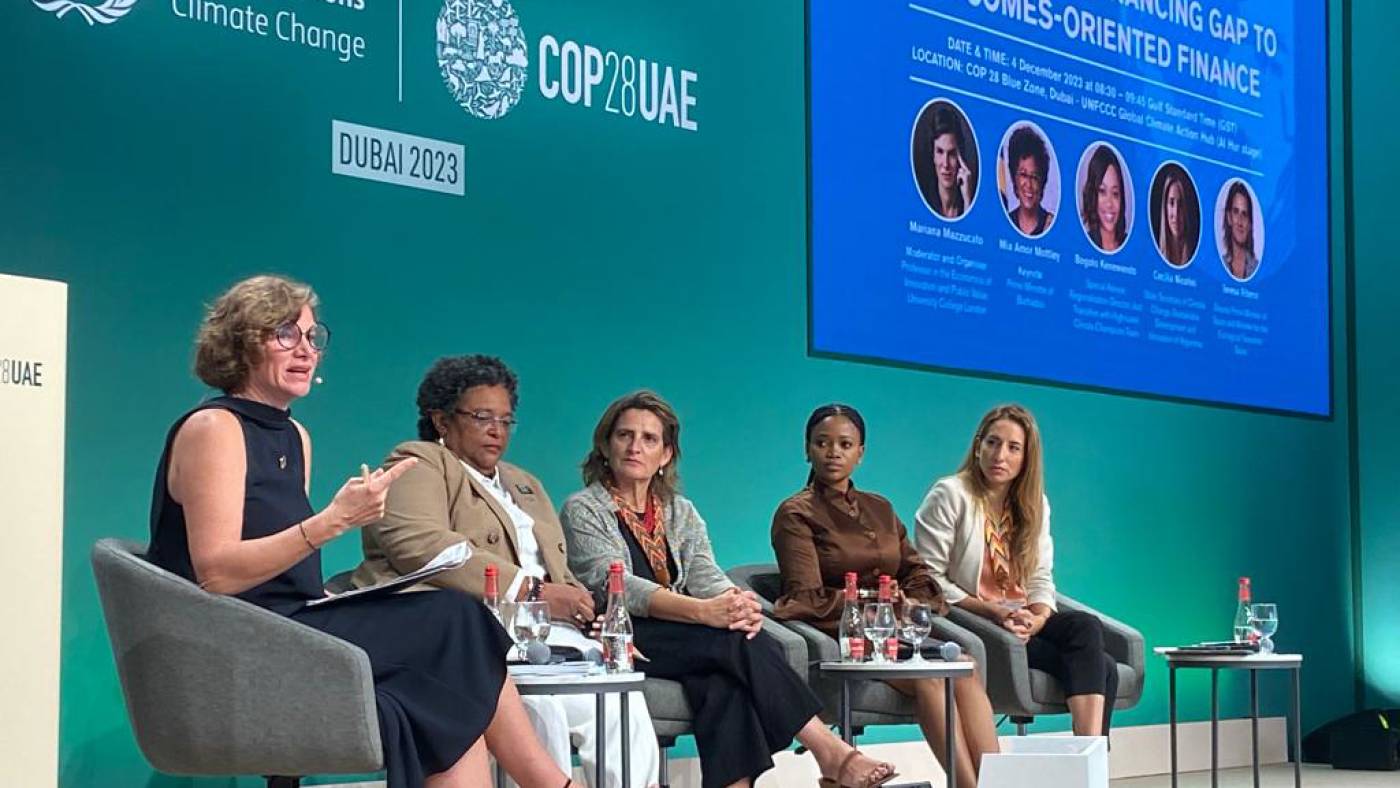
Professor Mazzucato joined on stage by Prime Minister Mia Mottley of Barbados, Vice President Teresa Ribera of Spain, Bogolo Kenewendo of UNFCCC, and Cecilia Nicolini of Argentina
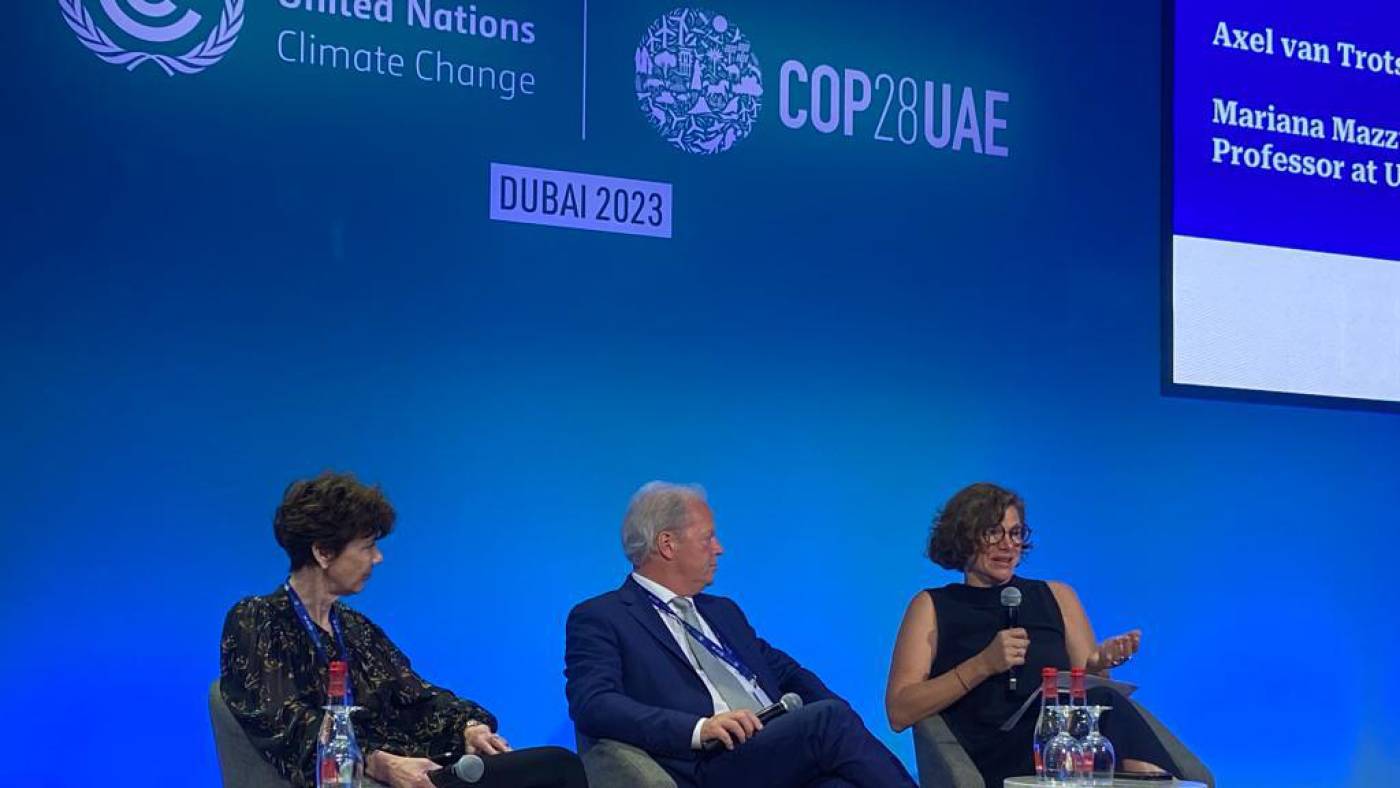
Professor Mazzucato gives the keynote address at the COP Presidency event on nature and water finance for climate action with Axel van Trotsenburg, Managing Director of the World Bank
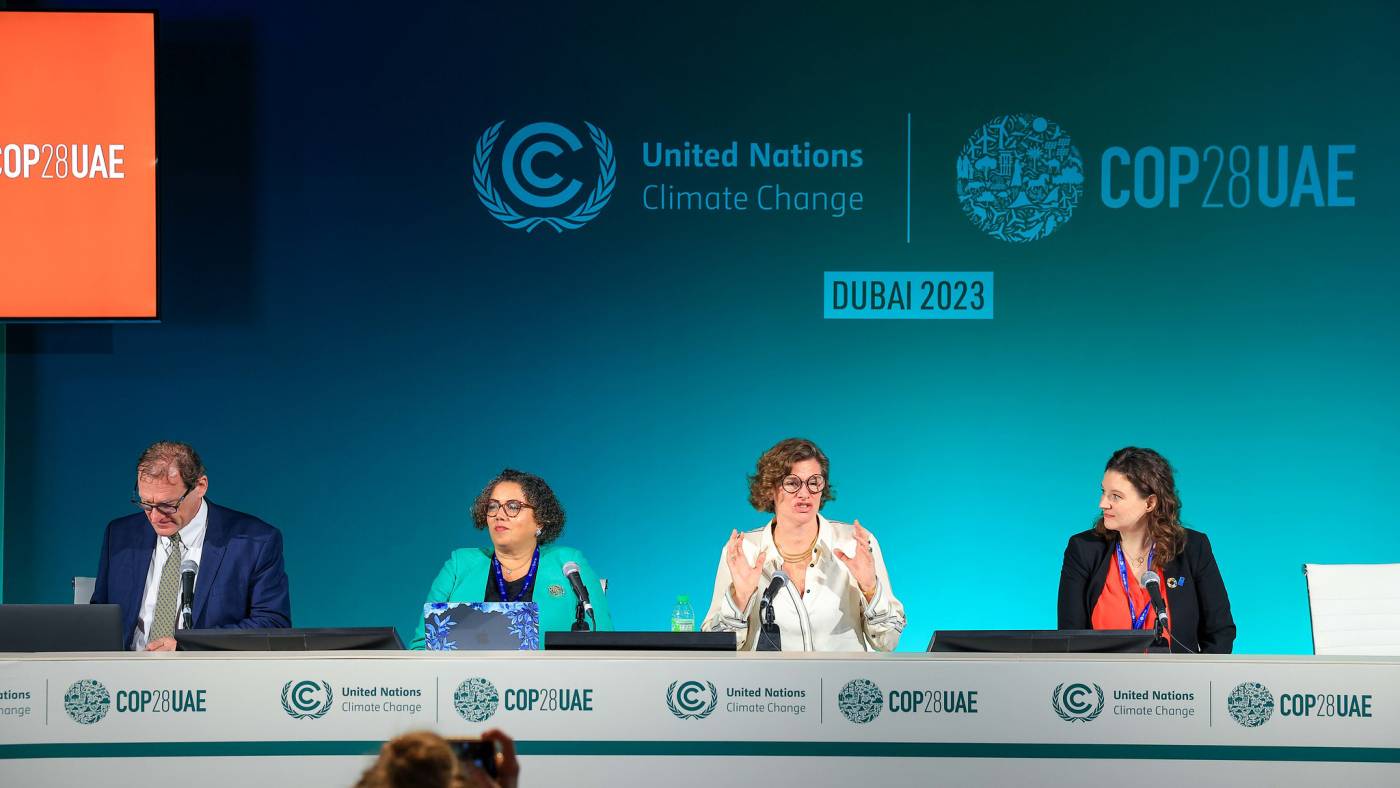
Richard Kozul-Wright, Tania Romualdo, Professor Mazzucato and Cassie Flynn during the UNCTAD and UNDP event on transforming financing for sustainable development

Professor Johan Rockström, Arunabha Ghosh, Sir Dave King, Professor Mazzucato and Nick Nuttal during an interview with WeDon’tHaveTime

Professor Mazzucato meets with Dilma Rousseff, President of the New Development Bank
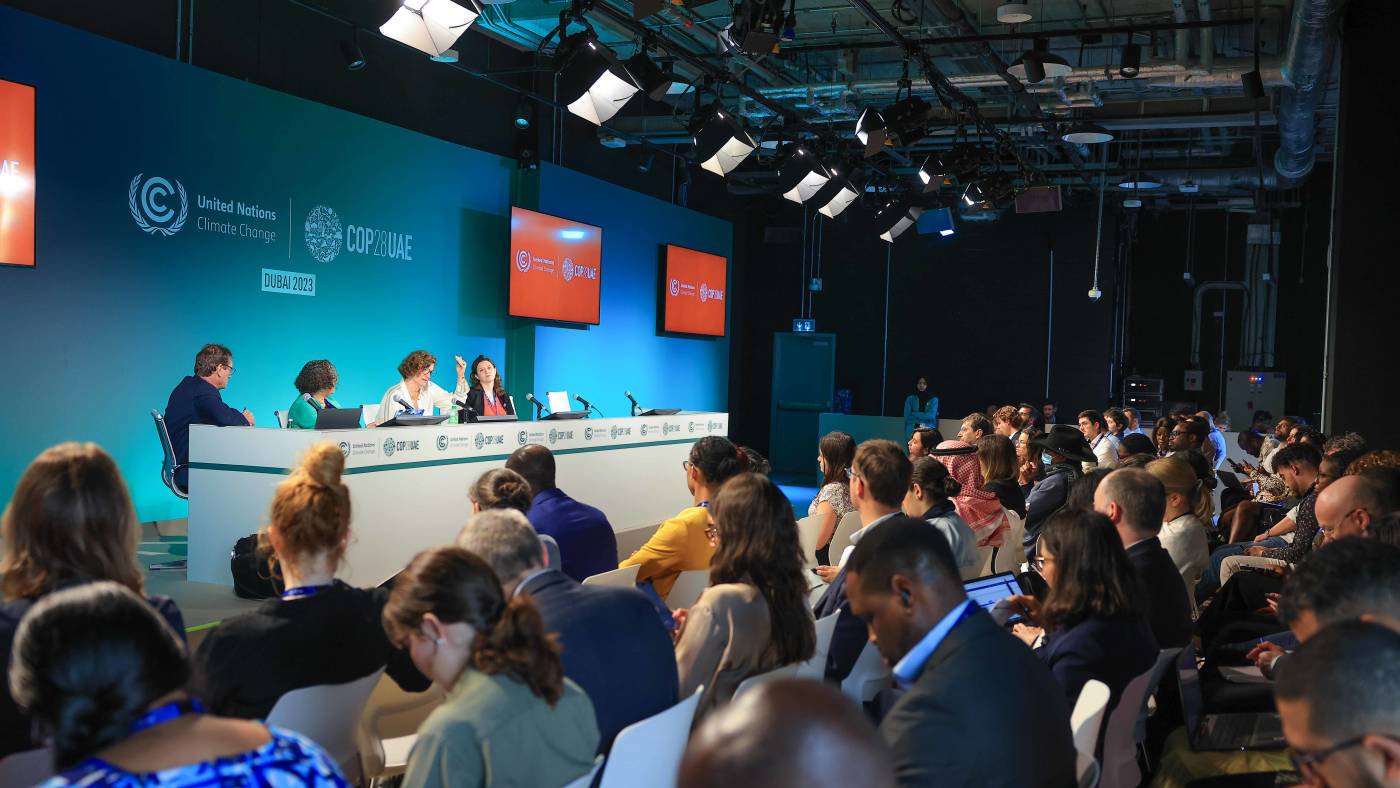
Professor Mazzucato delivers the keynote address at the UNCTAD and UNDP event on transforming finance for sustainable development

Prof Mazzucato was joined in Dubai by her Policy Advisor Luca Kühn von Burgsdorff and IIPP Cities Programme Manager Isadora Spillman-Schappell
 Close
Close

